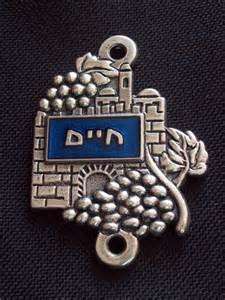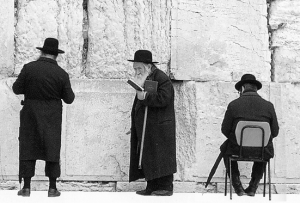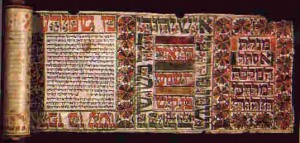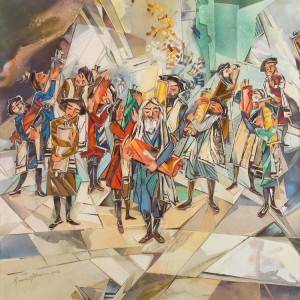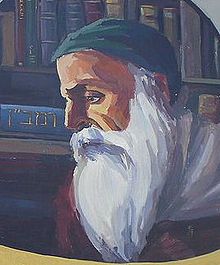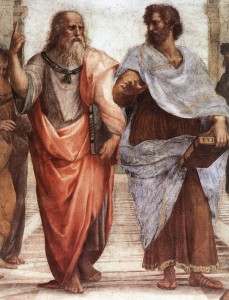 Aristotle, the student of Plato, and classical Greek philosopher excelled in his wisdom. The Rambam, Moses Maimonides in his “Guide for the Perplexed” states Aristotle reached the highest level of understanding a human being can reach short of prophecy. He calls him the greatest of philosophers. Yet, Maimonides refutes many of Aristotle’s basic tenets of philosophical speculation, especially his postulations regarding man’s duty in the world.
Aristotle, the student of Plato, and classical Greek philosopher excelled in his wisdom. The Rambam, Moses Maimonides in his “Guide for the Perplexed” states Aristotle reached the highest level of understanding a human being can reach short of prophecy. He calls him the greatest of philosophers. Yet, Maimonides refutes many of Aristotle’s basic tenets of philosophical speculation, especially his postulations regarding man’s duty in the world.
Thinking Vs. Prayer
Maimonides states that the virtue of man is to connect to the Creator through prayer. He says by establishing ongoing communication with the creator through the guidance of the Torah one can reach the highest levels of ones potential. Aristotle states that each creature has its virtue in its domain that it excels. A bird in Flying, a fish in swimming, a frog in jumping and a man in thinking.
It is brought in Jewish works that once Plato, Aristotle’s teacher, saw Yirmeayu (Jeremiah) crying about the destruction of the Beit HaMikdash (the Holy Jewish Temple). He asked what makes you cry about a heap of wood and stones. He asked him, are there any philisophical questions that bother you? Plato replied “Yes.” “Please ask them” Plato asked him deep questions – that Yirmiyahu answered satisfying Plato’s search for answers. He continued “It is through the inspiration from these stones I learned my wisdom.” (When the Temple was in existence, there was higher level of closeness to G-d, spirituality and holy inspiration.) Plato had intellectual interactions with Yirmeyahu. Aristotle, learned from Shimon HaTzadik, (Simon the Just). Impressed by this wisdom, apparently continued learning Torah till he converted to Judaism.
The Aristotle Letters
Aristotle wrote a letter to his student Alexander, the Great, notifying him of his recanting on his philosophies and acceptation of Torah as the true world philosophy.
There are two versions of the letter one found in the Meam Loez and One Found in the Sefer HaDorot.
We have included both versions below.
Aristotle’s Letter to Alexander the Great
written at the end of his life
Meam Loez – Shemot / Parashat Yitro – 19:17
There is a true story of a great philosopher renowned throughout the world, whose name was Aristotle – that at the time of his old age he wrote a letter to his student Alexander the Macedonian – the king of Greece (See source Shalshelet HaKabalah) this text:
Blessed is Hash-m [the G-d of the Jews – the sole G-d of the universe and of all], that opens eyes of the blind, that shows the sinners the straight path. He is exalted with praises that are worthy of Him – For I do not know how to praise Him upon all of the mercy and great kindness that he bestowed upon me.
That he took me out of this foolishness that I was immersed in all the days of my life in dealing with wisdom of philosophy to explain everything according to nature – that’s understood through rationalization.
And I made many books on this wisdom – like the sand that is on the banks of the of the sea.
Until I was rebuked now by the mingling of my life with one (Jewish) sage from the sages of Israel. And in his speaking to me, he demonstrated his tremendous wisdom.
And I recognized the high level of the holy Torah, that was given at the Mount Sinai.
And he drew my heart with the words of the Torah that showed me and explained to me true novelties and wonders that were done [by Hash-m, the G-d of Israel].
And I was uncivilized that I did not understand that most of the things that are driven by the Holy One Blessed be He [Hashem – the G-d of Israel] in a wondrous manner that’s external to the way of nature.
And from the time that I saw this – I took to heart to expound and to investigate [or fathom] the wisdom of the Torah. For all of its words are founded on foundations of truths, and it is not like the wisdom of philosophy that is vanity.
And therefore, you my student – Alexander the the great king – Do not push my works [for people to learn them]– not you and not my fellow philosophers.
For if it was in my hands to gather all of the books that I authored using this wisdom, surely I would burn them with fire in order that they would not remain any part of them.
However, this matter is not in my hands for my books are spread throughout the world and it’s impossible to gather them all.
And I know well of the stringent punishment that my Creator will punish me for this great sin that I transgressed. That I lost my time with my own hands and that I caused the multitude to sin.
Therefore, my son Alexander I wrote this letter in order to inform you, you and all of your fellows – that most of the things that people want to explain in the way of nature in order that they will be understood by the intellect are matters of falsehood.
For surely, the Holy One Blessed be He (Hashem – G-d), He is the Solution to the world and He leads it with great force.
And because of my fate that caused my books to be spread throughout the western lands – I hereby inform on all of them – that one should not waste his time with them. Do not look at them and do not touch them with your hands. For it is a great sin to waste time on my books of philosophy – for it is a lie that has no legs [to stand upon].
And now I have saved my soul with this that I proclaimed my error and my guilt – it [the Law of the Torah’s punishment] is not as stringent upon me for the past [faults of mine] for I didn’t know.
However now that I revealed this matter to the creatures – that I lived in error and my heart burns for the time that I destroyed with vanities. Woe is to those that their hearts continue [to follow] after my books. Surely under them will be the grave.
And know that according to what that same sage taught me – I found many matters in the book of proverbs that King Solomon authored that a person should not be drawn after the wisdom of philosophy in his saying to “Guard yourself from a strange woman from a foreign female whose words are smooth.” (Mishlei / Proverbs 7:5)
Woe to the eyes that thus they see. Woe to the ears that they thus is what they hear. Woe is to me that I destroyed my body and my strength – for these damaging matters. And this that you praise me by saying that my fame has spread throughout the world because of the books that I made. And they admire me with great admiration. Surely death is better than this – that my books are spread throughout the world. Surely those that are diligent in [the learning of] the Torah will inherit [eternal] life in the world to come.
And those that deal with my books will inherit purgatory. And even I am prepared to be punished for them all. And the reason why I did not write you this letter before now, for I suspected that you would be angry at me and you would do me evil. However now, I decided to say, to inform you of this.
For I know that before this letter of mine will arrive in your hand I will have already been placed in an ark of wood – for I reached the end of my days. And Peace from the Teacher Aristotle – that separates from [life in] the world – to Alexander the great king of Greece.
Second Version
After having translated the version of the “letter of Aristotle at the end of his life to Alexander the Great” found in the Meam Loez (by Rabbi Culi), I found the source of the letter that the Meam Loez referenced – in the work called “Shalshelet Hakabala” (by Gedalia ben Yechia)– and translated that letter from that source. “Shalshelet Hakabala” was printed in the Jewish Year 5346. The current year is 5768. This means it was written almost 422 years ago. Thus the public knowledge of the Aristotle letter has been in existence for over 420 years. There is an introduction to the letter from the author that names his sources where he learned of the letter.
In the paragraphs preceding the letter some interesting facts are mentioned about Aristotle, like:
Aristotle ultimately became a righteous convert [to Judaism] at the end of his life.
He was appointed over King Solomon’s works when Alexander the Great conquered Israel.
Some of the wisdom he learned from Solomon’s works is from where he fashioned some of his philosophies.
Aristotle studied with a Jewish sage called Shimon HaTzadik. (Simon the Just – a Chief Cohen of the Jewish Temple) He calls him the “Shimonite.”
There are stories in the Talmud where Shimon HaTzadik meets Alexander and Alexander gets off his horse and bows to him. Thus Alexander was also a contemporary of Shimon HaTzadik.
Alexander died in his thirties. Aristotle died at about 62 years of age.
Alexander the Macedonian entered into Jerusalem. He saw the Cohen Gadol [High Priest – Shimon HaTzadik] in his 8 garments. He descended from his chariot and bowed to the Cohen Gadol – Shimon HaTzadik. He told his servants and those that were present that the vision of the Cohen Gadol in His Garments appeared to him before each of his victories.
Alexander asked that an statue in the image of himself be placed in the Holy Temple. Shimon replied that this was against the Torah, but that to honor the king – all male Cohen children that would be born that year would be named Alexander and the year of the contracts would start from that year (ie, 1st year of the King Alexander). He was very happy and gave many gifts for the Temple.
There are small differences between the two versions of the letter. This is likely because the Meam Loez was translated from Ladino to Hebrew. The version of the Letter in the Shalshelet Hakabala was likely translated from Greek to Hebrew. So the letter translated from the Meam Loez went from Greek (Original Letter) (to Arabic? (Cited in Arab Historical Work)) to Hebrew (in Shalshelet Hakabala) to Ladino (Meam Loez Original Language) to Hebrew (Meam Loez translated Language) to English (Text Version above). We assumed by translating the letter from the version in the Shalshelet Hakabala would result in a more accurate translation of the original letter.
Aristotle’s Letter to Alexander the Great
written at the end of his life – Excerpts from
Shalshelet Hakabala – Cited by Meam Loez in Shemot / Parashat Yitro – 19:17
Aristotle, the philosopher and head of the [secular] sages was the teacher of Alexander and the student of Socrates and Plato. He was born in Macedon and lived 2 years after the death of Alexander his student and he lived 62 years. And I saw written -in the letters of Aristotle – that he wrote that he spoke with Shimon HaTzadik (Simon the Just) on the Godly wisdom and was tremendously impressed by the level of wisdom of Shimon in this and in certain details he says this is what the Shimoni answered me.
And I saw that Rabbi Yosef ben Shem Tov in the introduction to his explanation of the “book of Middot” how he saw in Egypt a book that written inside was how Aristotle at the end of his life admitted to all that is found written in the Sefer Torah of Moshe and became a Righteous Convert [to Judaism].
I saw in “the Kuzari” [a book that discusses the various faiths and their comparison to Judaism] – hand writings – saying 42 – that the philosophers were asked from where did they receive the wisdom of their philosophy. And they said that it came from the Jews – and all the wisdoms they recorded their sources and general principles from the Jews of Alexandria. And afterwards to Paras (Persia) and Medes and afterwards to Greece and afterwards to the Romans. And over time and much wanderings they did not remember the wisdoms were [originally] recorded from the Israelites – rather from the Greeks or Romans. Until here [is the quoted text].
…
And the author of the book Shevilei Emuna wrote – that he saw it written that when Alexander went to Jerusalem he appointed Aristotle, his master – [in charge] over the books of Solomon – and he recorded there the philosophy and he called it in his name…
The Rav (the Rambam) in the HaMoreh (Nevuchim – the guide to the Perplexed) section 1 perek 71 says that [all] Wisdoms were initially with the [Jewish people of] Israel – however in the domination of the [gentile] peoples upon us it [wisdom] came into their hands and we when we learn a matter from them it appears that their conception [of the wisdom] was from them but it is really the opposite.
Ibn Rashed who is called Oyrouou says in the end of his book “Hapelet Hatephila” that the wisdoms were found with Yisrael, and I saw an old work these things and I recorded them here word for word – and they – I testify – with a clear testimony – that I heard from the mouth of the sage Don Abraham Ibn Zarzer that when he was in Lisbona and used to say that the Ishmael sage Ibn Alachtov – that people used to say upon him that there was no one of his caliber in his generation in terms of wisdom and piety. And he heard that there was in the city of Alekhara a book from Aristotle that he authored at the end of his days and that he recanted from all that he had written initially. And the sage Don Abraham ibn Zarzer sent for this work and saw in it either the matter of [divine] providence or whether the matter of the leaving of the soul and also regarding the creation of the world. And he (Aristotle) would state on each and every matter from these – [that he admitted to have erred in them] and from certain natural matters – and the “Shimoni” [ie, Shimon HaTzadik – the Cohen Gadol] changed my mind on this opinion with this and this proof or with this and this argument. And it was written at the end of his book a writing that Aristotle sent to King Alexander – his student.
And this is the text of the writing:
Blessed is G-d [the G-d of the Jews – the sole G-d of the universe and of all], that opens eyes of the blind, that shows the sinners the path. He is praised with praise that is worthy for Him – that he bestowed [kindness] upon me – in his mercy and great kindness that that he took me out of the complete foolishness that I was in all the days of my life in dealing with wisdom of philosophy and that I would judge everything according to thoughts of the mind.
And I authored on it [philosophy] books – like the sand of the sea. And I made many books on this wisdom like the sand that is on the shore of the sea.
Until the end of my days I debated with a [Jewish] sage from the sages of Israel [This is likely Shimon HaTzadik – Simon the Just]. And he demonstrated his strong arm in the Torah that is an inheritance to them from Sinai and he drew my heart with words of Torah in his teaching me the signs and wonders with the holy names that are true and revealed to the senses.
And I because I did not know that most of these things are higher than the intellect and when I saw this I gave my heart to reflect with all my force on the Religion of the Jews.
And behold all of it is founded perfect stones and not like the dark wisdom of philosophy.
Therefore, my precious student – Alexander the the great king – Let not my books cause you to err.
Even you and even your friends the philosophers –
for if I was able now to gather all my books that spread throughout all the lands, I would burn them with fire in order that not even one would remain for the eyes of the princes and the deputies in order that they do not err in the thinking.
For I know that I will receive great punishment from the G-d – for I sinned and I caused the multitudes to sin.
Therefore, my son Alexander I inform you and all the people of the world that most of the things that are known through the mind they are falsity for higher and higher it is guarded [possible explanations, the ones who profess them that are in high positions know their falsity; the truth is guarded higher than what the philosophers think – ie in the Torah].
And because of my fate that caused my books to be spread throughout the western lands – I hereby inform them – with a reliable proof – that it is not worthwhile to look in them and not to review them. For its logic is a transgression and the philosophy is false.
And now that I am cleared from Hash-m – for I transgressed unknowingly.
And woe to those that look in then for they go in a confused path to destruction.
And know that just as that same sage taught me about our wisdom – this [matter – that a person should not be drawn after the wisdom of philosophy] was also prophesied by Solomon son of David in his proverbs in his saying to “that they [words of Torah] guard you from a strange woman [secular philosophy]…” (Mishlei / Proverbs 7:5) “Do not extend your heart in her [phiosophy’s] path” (Mishlei / Proverbs 7:25) and it is written “All those that come to her [philosophy] will not return…” (Mishlei / Proverbs 2:19)
Woe to the eyes that thus is what they see and woe is to the ears that thus is what they hear.
Woe is to me. Pity is to me for I withered my body and my finished off my days in these matters that damage but are not useful. They bring down but do not elevate [a person]. And that you said to me that that my fame has spread amongst all the peoples – that I authored many books and there will be for my fame all the days of the earth.
Know – that I would [rather] choose to have fame in a scroll of the Torah – than to have fame in my books of apostasy. And I would [rather] choose strangulation of my soul than for my books to be widely distributed. For those that cling to the Torah go to light with the light of life. And those that cling to philosophy they go to the pit of the destruction [ie, the grave].
And also I in the future will be punished for all of them. And I did not write you this before this time, in order that if you would be angry at me and you would do me evil, I know that before this writing of mine will arrive to you I will already be dead – lying in the earth. And Peace from your teacher Aristotle – that goes to house of his world. to Alexander the great king.
People have asked how can one be sure that this is an authentic letter? There are many supports to its authenticity cited in the Shalshelet Hakabala. The dates of Aristotle’s and Alexander’s existence coincide with the existence of Shimon HaTzadik (Simon the Just). The lengths of their lives are accurate. There are other sources that say that Aristotle ultimately became a righteous convert to Judaism. Also the Rabbis that brought this letter in their books were tremendously scrupulous in speaking the truth – they would be even more careful in writing the truth. The style of Aristotle is similar to his other works.
One might pose a question – Can this be a true letter if at the end of the letter Aristotle says he is about to pass away – this implies that Aristotle died before Alexander? Alexander died 1 – 2 years before Aristotle? This is easily dismissed by saying perhaps Aristotle thought he was going to die and was healed or lived a little longer than the doctors predicted. Or perhaps Aristotle said this so that he would not be pursued by Alexander. Or perhaps he wrote the letter while sick to Alexander and then Alexander died abruptly. [Alexander was finally poisoned to death].
Alexander died when Aristotle was about 60. This means that Aristotle must have written the letter before that time (assuming he received the news of Alexander’s death occurred relatively quickly). This means that Aristotle was aware of the truth of the Torah for at least the last 2 years of his life. It is likely that after having accepting the Torah’s truth, he followed the seven Noahide laws (Sheva Mitzvot Bnai Noach) from the Torah incumbent upon all gentiles, before he converted to Judaism. There are many Jewish sources that cite Aristotle. Shalshelet HaKabala writes that he ultimately became a righteous convert to Judaism.
Existence and Links to these letters were once posted on Wikipedia. After being posted, someone quickly censured the information. The letters are translated from the Hebrew books mentioned above.

